In December 2022, Germany’s foreign minister handed 22 artefacts looted in the 19th century back to Nigeria at a ceremony in Abuja.
The return of these artefacts, a set of Benin Bronzes, follows a deal earlier that year to transfer ownership of more than 1 000 of these precious objects back to the actual owners.
Benin Bronzes are among thousands of metal sculptures, plaques and carvings made between the 15th and 19th centuries and looted by British troops in 1897 from the kingdom of Benin.
The sculptures are invaluable not only because of their beauty and artistry. They have valuable spiritual and historical significance for the people of Benin.
Their theft remains a painful part of the history of the Benin people (and their descendants) in Nigeria.
Many of these artefacts were later auctioned off in London, and German collectors bought some.
Germany holds around 1 100 of the estimated 5 000 artefacts Britain stole.
Germany’s handover was in response to a formal repatriation request issued to museums worldwide by Nigeria’s National Commission for Museums and Monuments.
In November 2022 (before the handover), London’s Horniman Museum (a private charity) returned dozens of items to the Nigerian government, making it the first museum in the UK to officially take such action.
Germany’s foreign minister, Annalena Baerbock, said the handover in Nigeria was part of Germany’s efforts to deal with its ‘dark colonial history’, and an opportunity to right some of the wrongs of the past.
Germany has been doing its best to attune to its colonial atrocities.
In 2021, it officially acknowledged committing genocide during its occupation of Namibia.
In recent years, Germany has also returned human remains to Namibia, some of which were used in racial classification.
So, what about land? Namibia is a country where joy earned from dispossession lives side by side with the agony of the dispossessed.
NATURE’S ARTEFACT
A parcel of land is an object made by nature with high cultural or historical value and interest.
It is not an artefact in the sense of gold and silver wares made by humans.
It is nature’s artefact (or heritage) for past, present and future generations. Apart from being an economic asset, it is also a cultural asset.
Spiritual value is attached to its ownership and use. Land is considered ancestors’ homes because it is where they are buried.
In many African communities, the umbilical cords of newborns are also buried there. When boys are circumcised in many communities, their foreskins are buried there.
Many ethnic groups across Africa stand or kneel barefoot when they want to communicate with their ancestors. They do this through libations to revere the land where their ancestors lie.
These practices make people spiritually attached to land.
Land, in traditional African societies, is also revered. It gives people their place and identity.
Without it, people will always feel incomplete. That is why people also clamour for its return when it is taken from them forcefully – irrespective of whether this was done socially, legally or militarily.
RETURNING LAND
I do not literally equate the return of movable objects to land.
In the case of land, the returnee hands back physical access (use and ownership) rights to the actual owner.
My point: Returning artefacts is not too different from returning land parcels, except that in the case of land, African governments must work through reforms to European governments to design modalities to make it work in a ‘win-win’ situation.
However, the idea that land reform can take place without loss of land by those holding the land is nonsense.
Land dispossession happens with land-taking. So, land redistribution or ‘return’ cannot occur without land-taking.
Making this possible depends on policy innovation, creativity and the political will of governments to practise good land governance.
Assumptions and biases underlying people’s understanding of the return of land merit scrutiny.
To beneficiaries of forcefully possessed land, the cost of return is unfathomable. To inheritors of the dispossessed land, the cost of no-return is unforgivable.
National governments must provide an enabling environment for citizens to uphold their civic responsibilities.
Where the law or policies allow, foreign governments must support the national governments with the needed finances to repossess and allocate land to the dispossessed for their basic needs.
WHY?
You might be thinking, “Why should a foreign government directly supply funds to settle colonial-based land dispossession in Africa?”
My response is, why should a government supply funds to help Ukraine? The United States has spent more than 100 billion dollars in Ukraine, and the EU nearly 100 billion Euros.
Perhaps less than one billion dollars (or euros) is needed to help “return” land in African countries where it was once taken.
- Uchendu Eugene Chigbu is associate professor (land administration) at the Namibia University of Science and Technology (Nust), and coordinator of Network of Excellence on Land Governance in Africa (Nelga). Views expressed in this article are entirely his own, and not those of Nust and Nelga.
Stay informed with The Namibian – your source for credible journalism. Get in-depth reporting and opinions for
only N$85 a month. Invest in journalism, invest in democracy –
Subscribe Now!






